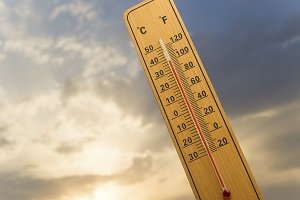The Heat is On - What You Need to Know

DETROIT – With an excessive heat warning in effect through Saturday, “people need to listen to what their body is telling them” to avoid heat illness, says Jason Vieder, D.O., a Henry Ford Health System emergency medicine physician.
Heat illness can be deadly if you avoid signs like weakness, fatigue, dry mouth, dark urine and dizziness, he says.
“You want to pay attention to your body’s cues,” says Dr. Vieder, division head of Emergency Medicine at the Henry Ford Medical Center-Fairlane in Dearborn. “If you’re not feeling well or feeling weak, we’d rather see people come to the Emergency Department sooner than later. If you’re not sure, this means you should probably come in.”
- Heat cramps, heat exhaustion and heat stroke are the most common heat-induced illnesses. Heat cramps usually occur after rigorous exercising. The person is not dehydrated and the body’s temperature remains normal.
- Heat exhaustion is like heat cramps except that the person is dehydrated. Symptoms include fatigue, dizziness, headache, delirium, nausea and rapid pulse rate. Left untreated, it can lead to heat stroke.
- Heat stroke is life threatening. Infants, elderly people, obese people and athletes are most at risk. Symptoms include a sharp rise in body temperature, nausea and confusion. Also, the skin is hot and dry and the body often stops sweating.
“Really, at this point you want to try and stay out of the heat,” Dr. Vieder says. “This is a bad time to go for that run you’ve been meaning to go on, to take a really long walk or spend long periods of time outdoors. As the heat index rises, it combines with the humidity, which exaggerates the heat on our body.”
When exposed to excessive heat, the body starts to lose fluids. Water from the skin and respiratory tract begins to evaporate from the body and blood flow to your skin increases significantly. In response, the body starts to sweat to cool the body. That is when dehydration can take hold.
“It’s like a convection oven, where more heat transfer occurs because there’s more heat on the outside than there is coming from the body,” Dr. Vieder says.
Dr. Vieder advises parents of young children and pet owners to be vigilant and extra cautious. It goes without saying, neither children or pets should be left unattended in a vehicle.
“I tell parents all the time ‘your parental instincts will never lead you wrong,’” he says. “If your child is not as active or not as playful – those are other indicators the heat is overwhelming them.”
Dr. Vieder says the three H’s are essential to avoiding heat illness: hydration, hydration, hydration.
“If your urine is dark or you’re not urinating frequently, that’s a sign you’re not drinking enough,” he says. “You definitely want to be drinking water or sports drinks if you are going to be outside for any extended period of time.”
Tips for staying cool:
- Go to the mall, movie theater or public place where there’s air conditioning.
- If without air conditioning, fans will help circulate the air.
- Take a lukewarm bath.
- Wrap a cool towel around your neck.
If going outside, remember to:
- Wear broad-spectrum sunscreen with 30 SPF or higher.
- Wear loose-fitting clothing, hat and sunglasses.
- Avoid drinking alcohol as it acts as a diuretic and will lead to dehydration.
###
MEDIA CONTACT: David Olejarz / David.Olejarz@hfhs.org / 313.874.4094
.svg?iar=0&hash=F6049510E33E4E6D8196C26CCC0A64A4)

/hfh-logo-main--white.svg?iar=0&hash=ED491CBFADFB7670FAE94559C98D7798)









